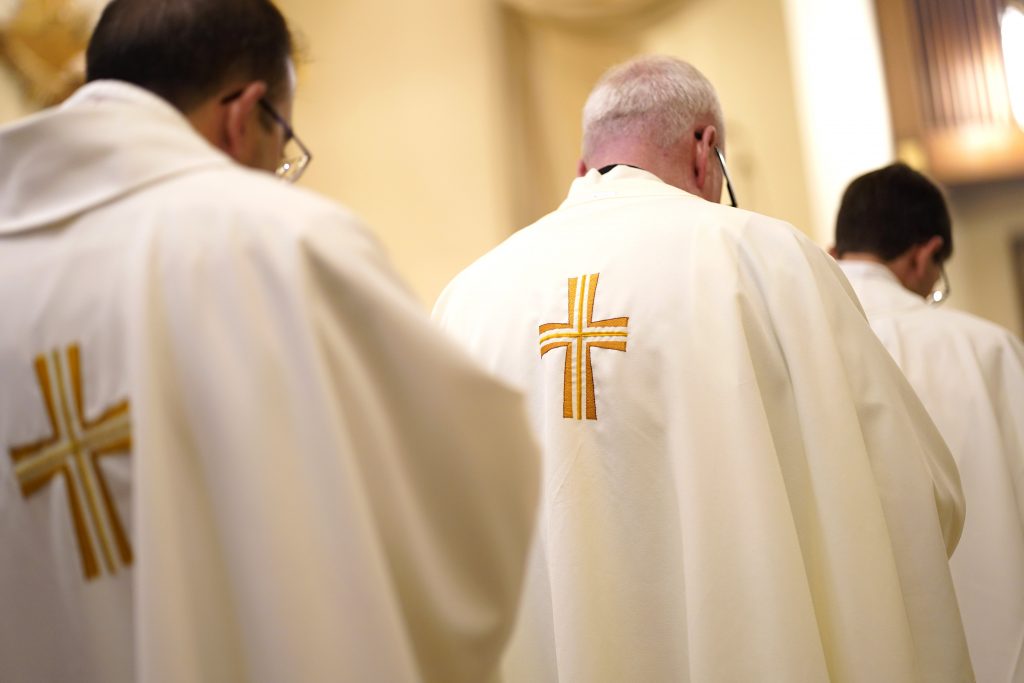A Catholic University of America study of United States diocesan priests’ opinions has found that most are happy doing what they have been called to do. However, there are some dark clouds in the survey’s results.
A little less than half of priests responding expressed positive feelings about their bishop. Only a quarter said they were confident in the leadership of the episcopacy in general. More dramatically, some 80% of respondents said they worried about being the victim of a false accusation of sexual abuse. The phrase commonly used among clergy is “guilty until proven innocent.”
These numbers reminded me of a book by a man I knew well in El Salvador, Msgr. Jesus Delgado. He was the biographer of St. Oscar Romero and part of the successful effort for his beatification and canonization.
While St. Romero’s cause was in a hiatus, Msgr. Delgado published a book called, “Asi Tenia que Morir: ¡Sacerdote!” which roughly translated means, “He Had to Die as a Priest!” Culling from the sainted archbishop’s notebooks, Msgr. Delgado reflected on the centrality of Msgr. Romero’s priestly vocation in his struggle for sanctity.
Msgr. Delgado even wondered sometimes aloud whether some of the archbishop’s erstwhile supporters, specifically some well-to-do women, may have arranged for him to be assassinated at the altar out of respect for Romero’s concern that his witness be as a priest.
Many times, in preaching and in print about bishops, we hear about St. Augustine’s declaration to the faithful that, “For you, I am a bishop, with you I am a baptized believer.” Given the credibility gap between priests and bishops, I think the idea should be amended. The bishop could say to his clergy, “For you, I am a bishop but with you I am a priest.”
In Latin America, it was an old joke that when the bishop comes for a visit, he never gets a bad bed to sleep in, or a bad meal, or the truth. There is always a kind of tension between superiors and subjects, but I think the truth that the bishops have to look at is that there is a trust problem between them and their priests.
Some years ago, a conservative bishop was appointed by St. Pope John Paul II to the See of Berlin. At his installation, the bishop acknowledged the discontent of priests of the diocese. He compared their relationship to a marriage. Both sides have to give and often “give in.”
I’m sure bishops are frustrated with priests and their problems, both pastoral and personal. Neither side is blameless. But the situation calls for some noblesse oblige on the part of bishops.
Benjamin Disraeli, the British prime minister, commented on the decline of religion in his day. Formerly, he said, a man in difficulties would talk to his pastor, but “now,” he wrote, “he only talks to his solicitor [lawyer].”
There is a crisis when some bishops seem to identify more and confide in lawyers than in their priests. Issues they used to take to their spiritual director, now have bishops calling their legal departments and communications officers first. “The bishop won’t see you by yourself,” a disgruntled priest once told me, “You might as well bring a lawyer.”
Yet, the Catechism teaches us that there is “an intimate sacramental brotherhood” shared by priests and bishops. In “Pastores dabo vobis” (“I shall give you shepherds”), his letter on the formation of priests, St. John Paul said that priests share with their bishops in a “collective mission.” What this most recent survey shows, and this is confirmed by myriads of anecdotes, is that collegiality is absent in many ways in the new clerical culture. There is a lack of confidence on both sides. Sometimes it seems that the bishop acts more like a “Dutch uncle” than an older brother.
That is why I think Church leaders need to make it a priority to rebuild a clerical culture that will nurture solidarity. This is hard work, but it will be repaid. It will inspire priestly vocations and a renewed solidarity of the clergy will be echoed by a new sense of community among all believers. The alienation of the clergy is like a cancer in the body of Christ.
In Msgr. Delgado’s book, he draws numerous key insights from St. Romero’s spiritual notebooks about priestly spirituality and life. One quote is quite striking:
“The things that divide us priests are our lack of priestly culture, the rumors, the lack of trust, the intrigues, lack of understanding, lack to real friendship, ego, envy, lack of solidarity with sick and infirm priests, the lack of support and animation for each other, the lack of appreciation of different charisms. There is a problem in our lack of discretion in our conversation about priests to the laity. Our judgment of each other, often without proof. There is also sometimes interference in ministry.”
It should be clear that the archbishop was not differentiating himself from his priests in remarks that are almost brutally honest. He speaks of what “divide us priests,” “our lack of priestly culture,” “our lack of discretion in our conversation about priests to the laity,” “our judgment of each other.”
The human, fraternal solidarity of a bishop with his priests should be more important than fears of adverse press or the cautions of legal advisers. Obviously, many priests do not think that’s a priority for bishops at present. That represents a real wound that needs to be healed. Certainly something “devoutly to be wished” and prayed for.

